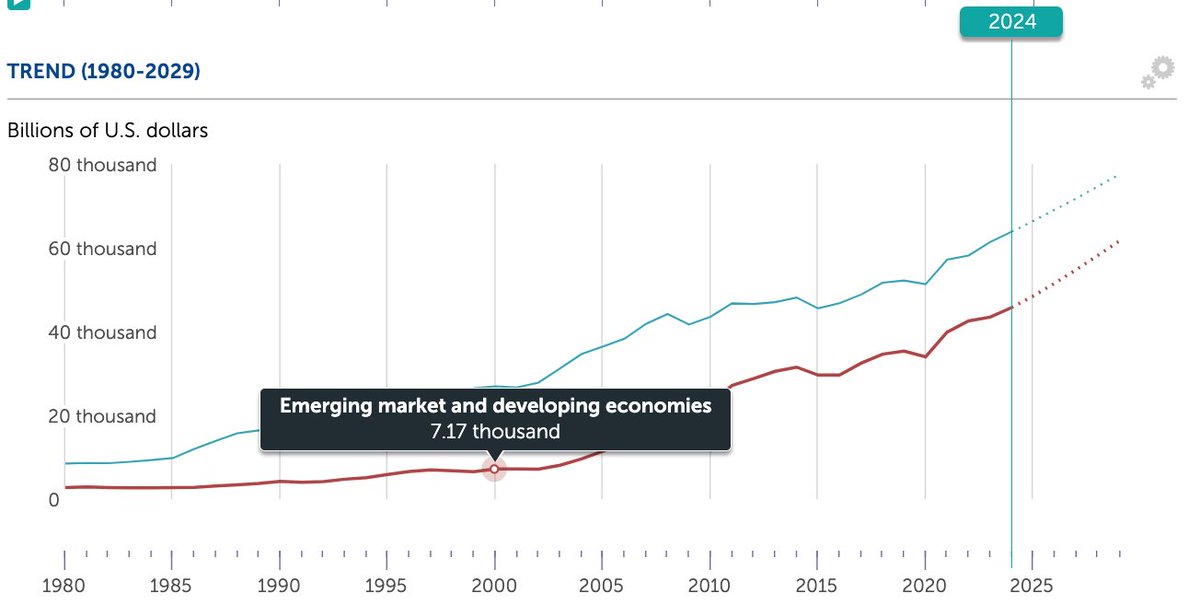Let's make some predictions about financial warfare, trade warfare, etc., purely speculative, please don't criticize if you don't like it:
Financial Warfare:
Financial warfare is basically coming to an end, and the conclusion is that the United States has not won. By "winning," I mean at the level of events like the 1997 Asian financial crisis and the 1991 dissolution of the Soviet Union. In simple terms, the rabbit is very uncomfortable, but it is clearly going to get through it. The current issue is whether there will be an interest rate cut in the next 3 months or by the end of the year, but the direction of the interest rate cut should be unquestionable. Do you think they will keep getting higher forever? The likelihood is very small. Just look at the proportion of interest payments to government revenue in the United States, and you will know that high interest rates are not sustainable. Whether it will ultimately move towards ZIPA (0 interest rate) is still unknown, but it should be around 2-3%.
Trade Warfare:
- The trade war started in 2018, and it seems that it will only escalate gradually, without any retreat. Now the trade war has become the political correctness of the United States, and even if a new president comes in, there will be no difference. The end point of this trade war is for the United States to impose comprehensive sanctions on China, similar to those against Russia and Iran. The United States definitely wants this, but it is currently not feasible, so the supply chain needs to be shifted first.
We don't know who will win or lose, so we won't make any guesses. I just feel that the key to winning or losing is primarily Europe, which means the most extreme scenario is the United States, Europe, Japan, and Australia imposing sanctions on China, and the least extreme scenario is the "Five Eyes" imposing sanctions on China, and so on. We define the former as "losing" and the latter as "winning."
Regardless of the outcome, China will continue to trade with countries in the global south, which will not be affected by this trade war. The purchasing power of the global south has risen sharply in the past 20 years. The ratio of GDP between the north and south was 1:4 20 years ago, and it is now 4:6, based on current prices. If calculated by purchasing power parity, it has already exceeded.
So in the long run, China will continue to trade with the global south, and this proportion will continue to increase.
If China wins, the United States will definitely launch a hot war as a last resort. This will be directly addressed in the next subsection.
If Europe joins the U.S. camp, it will be considered a loss for China. In this case, the following scenarios may occur:
- China's overcapacity will face a significant reduction
- The overcapacity will inevitably be transferred out, and currently, it may mainly go to Vietnam and Mexico
This will be a very difficult situation for the economy. But I don't think it's necessarily a bad thing? Why? Because reform is always forced. The current situation suggests that the more difficult it is, the more open it will be. Conversely, when the economy is good, it may sometimes be complacent. This conclusion can be drawn from the past few years, but it still needs to be observed.
In a more market-oriented China, I am actually optimistic about China's long-term future. Population and other factors are not a problem, as the populations of Southeast Asia and North Korea can be a supplement. Even without supplementation, there is still a lot of room for urbanization in China, at least for the next 10-20 years.
Hot War:
If the United States cannot win the trade war, it will definitely launch a hot war. Why? The United States absolutely cannot accept being surpassed by China, which has been clear since 2017, so the United States must knock China down. Previously, every challenging country has indeed been knocked down by the United States, including Germany, the Soviet Union, and Japan, so this script will not change. When a hot war is needed, the United States will definitely not hold back - there should be no illusions about this.
So how will the hot war start? It is very clear that it will be in the South China Sea or the Philippines, similar to the Russia-Ukraine situation, starting as a proxy war and then escalating gradually. The uncertainty here is whether Japan will participate.
From Japan's perspective, participating in the war is all harm and no benefit. Why? What if China wins? The United States is far away, and China cannot go after them, but you, Japan, are right next door. Of course, China also has the possibility of losing, which no one can guarantee. But as a developed country, is it necessary to take this risk? Even if the rabbit is not good, it is still a nuclear power, and you cannot afford to cut off the northeast again. Of course, the rationality of the rulers of Japan is incomprehensible, so let's assume they have a shred of rationality here.
That's about it. Ultimately, I think we can continue to observe the Russia-Ukraine situation. The behavior patterns of both sides in Russia and Ukraine will provide a template for a hot war in the South China Sea, with no major deviations.
I hope Russia and Ukraine don't end up throwing nuclear bombs at each other. Putin once said: If Russia is destined to perish, he doesn't mind taking the world down with it.

免责声明:本文章仅代表作者个人观点,不代表本平台的立场和观点。本文章仅供信息分享,不构成对任何人的任何投资建议。用户与作者之间的任何争议,与本平台无关。如网页中刊载的文章或图片涉及侵权,请提供相关的权利证明和身份证明发送邮件到support@aicoin.com,本平台相关工作人员将会进行核查。




